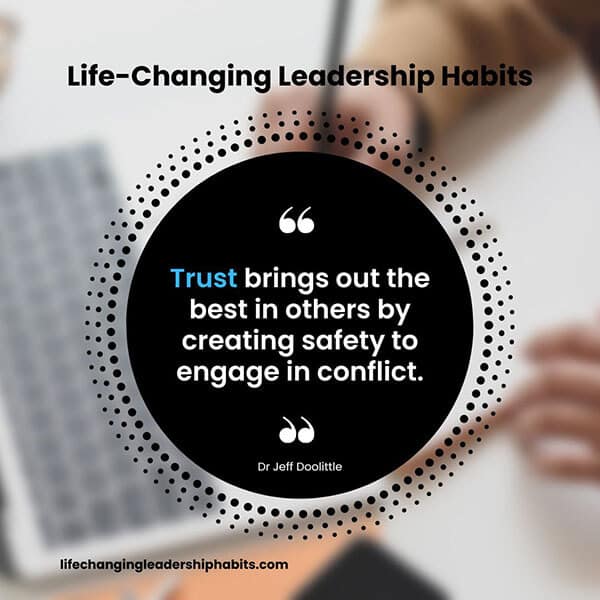Christian Values: How to Create Profitable Trust-Based Relationships with Dr. Jeff Doolittle
August 8, 2023
Successful businesses are built upon relationships, and trust is the currency of relationships. Businesses cannot succeed without trust. Trust opens doors to key stakeholders, shifts discussions away from price, and makes room for taking risks. Evidence suggests that businesses encounter increased competitive disruption without trust, and leaders are challenged by essential stakeholder indifference. Distrust breeds polarization in the workplace. A recent global survey representing more than 32,000 people found less than 30% of employees willing to help a coworker in need and less than 20% willing to live in the same neighborhood with a coworker with a different point of view on things that matter. Now more than ever, the marketplace is full of information, but most of it is not viewed as credible. Both for-profit and non-profit businesses are not considered trustworthy. Companies are perceived as failing to deliver on promises deemed important by society. Leaders must take steps to create trust-based relationships that foster economic and valued collaboration. Here are the Christian values that will move you closer to your goals.
6 Trust-Based Relationship Behaviors
Relationships based on a high degree of trust are the most valuable. Trust is defined as the reliance on the character, ability, strength, or truth of someone or something. Trust is earned and occurs between two people.
Trust-based relationships move beyond providing information, solutions, and ideas to focus on the most complex and helpful issues. They lead to lower costs and higher value repeat business. Trust-based relationships allow others to be open and without concern for being vulnerable.
Creating profitable trust-based relationships starts with engaging the right person on the right topic. This requires asking powerful questions and listening for cues in responses. Listening involves hearing the emotions of what is being shared and the details of what is shared.
Effective listening balances providing space for discussion with knowing when to summarize and paraphrase what has been shared. Trust-based relationships involve understanding not just what is heard but why it is desired by the other person and how to achieve the mutual goal.
It is creating a safe, supportive environment that produces respect and trust. Evidence suggests that the following behaviors are essential for establishing trust and intimacy in relationships:
- Shows genuine concern for the client’s welfare and future.
- Continuously demonstrates personal integrity, honesty, and sincerity.
- Establishes clear agreements and keeps promises.
- Demonstrates respect for the client’s perceptions, learning style, and personal being.
- Provides ongoing support for and champions new behaviors and actions, including those involving risk-taking and fear of failure.
- Asks permission to coach clients in sensitive, new areas.
How Trustworthy Are You?
Trustworthiness is made up of four essential attributes:
- Credibility is the most frequently achieved attribute of trustworthiness. It has rational and emotional aspects of an individual’s expertise and presence.
- Reliability is based on the frequency of interactions with someone and the consistency of expected behavior.
- Intimacy requires a personal willingness to have a courageous conversation. This is one of the key differentiating attributes of trustworthiness.
- Self-orientation relates to the amount of focus placed on oneself versus the emphasis placed on the other person. A high degree of self-orientation creates significant distrust from others.
Assigning values to each of the four trustworthy attributes and placing them into a trust equation allows you to measure your trustworthiness in any relationship.
Trustworthiness = (credibility + reliability + intimacy) / self-orientation
Measuring trustworthiness provides helpful structured insights with the potential to improve trust-based relationships. Evidence suggests that improving trust-based relationships leads to enhanced productivity and profitable results.
Take a free relationship trust quiz to assess the trust of one of your relationships.

The Role of Christian Values
Christian values enhance trust-based relationships creating a competitive advantage in the marketplace. Evidence suggests that your values predict behaviors in most situations. Also, a study on the formation of trust in business and the role of personal values revealed significant interactions of personal values on trust formation for employees and customers.
As Christians, individual virtues and values are inspired by God through prayer, meditation, Bible reading, and the Holy Spirit. In Psalm 119:30, King David states, “The unfolding of your words gives light; it gives understanding to the simple.” The apostle Paul in Galatians 5:22-23 presents a list of values that define a Christian: love, joy, peace, patience, kindness, goodness, faithfulness, gentleness, and self-control.
These values are not confined to only spiritual matters but are to be lived out in all parts of life. Paul confirms this point in Colossians 3:23, “whatever you do, work at it with all your heart, as working for the Lord.”
Additionally, God sent the Holy Spirit to partner with Christians as a helper, advocate, comforter, and counselor to live out Christian values. Paul states in Ephesians 3:16, “that according to the riches of His glory, He may grant you to be strengthened with power through His Spirit in your inner being.”
Agape Love, The “Not So Secret” X Factor
There is one virtue that Jesus emphasizes above all the others. In Matthew 22:36-40, when Jesus is asked which is the greatest commandment, He replies: “Love the Lord your God with all your heart and with all your soul and with all your mind. This is the first and greatest commandment. And the second is like it: Love your neighbor as yourself. All the Law and the Prophets hang on these two commandments.”
Loving your neighbor as yourself is found eight times in the Bible. The Greek word used in this passage of scripture for love is “agape.” This type of love is like saying to someone that you are more significant and valued than I am. Whatever I do will take into consideration your best interest.
Selfless love is transformative within relationships and maximizes the effectiveness of trust-based relationships. Evidence suggests that practicing selfless love within organizations creates relationship alignment and increases productivity and success.

The Urgency for Christian Values in Leadership
Christian values positively influence profitable trust-based relationships and are desperately needed in today’s polarized workplace. Business leaders today are focused on results to survive and thrive in a fast-changing and competitive marketplace. Yet, the most pressing issue is rarely “the” issue.
Engaging others in resolving their complex and most helpful issues requires first earning trust. Taking time to assess your personal credibility, reliability, intimacy, and self-orientation provides the opportunity to improve trust-based relationships.
A leader’s values significantly enhance trust formation. While leader behaviors define what a leader should do, their values determine what they will do. Leading with Christian values, such as selfless love, is a proven way leaders can create profitable trust-based relationships.
Dr. Jeff Doolittle

Organizational Talent Consulting
(616) 803-9020
References
Bardi, A., Calogero, R. M., & Mullen, B. (2008). A new archival approach to the study of values and value–Behavior relations: Validation of the value lexicon. Journal of Applied Psychology, 93(3), 483–497.
Edelman. (2023). Edelman trust barometer: Navigating a polarized world.
Ferris, R. (1988). How organizational love can improve leadership. Organizational Dynamics, 16(4), 41-51.
Fukuyama, F. (1995). Trust: The social virtues and the creation of prosperity. Free Press.
ICF. (2019). Coaching competency model. International Coaching Federation
Kiel, F. (2015). Return on character: The real reason leaders and their companies win. Harvard Business Review.
Maister, D. H., Green, C. H., & Galford, R. M. (2000). The trusted advisor. Free Press.